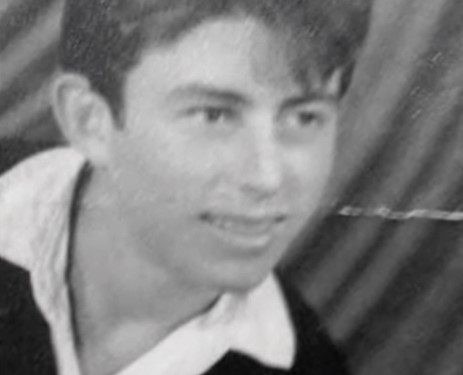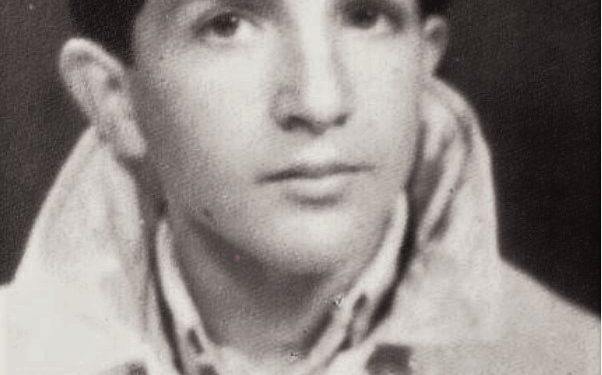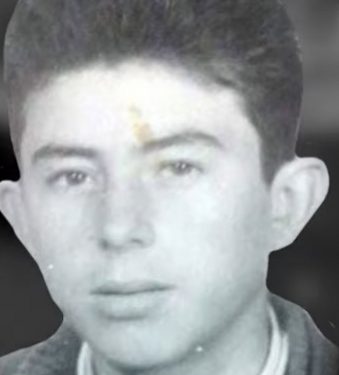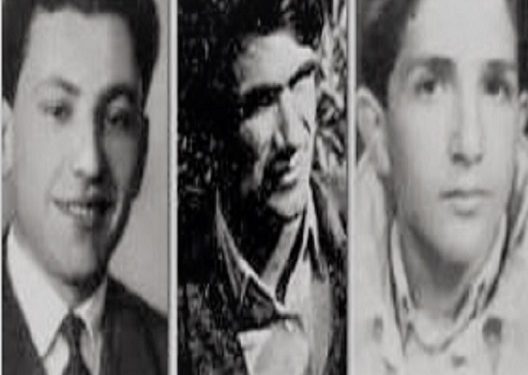By Shkëlqim Abazi
Part forty-one
Memorie.al / I were born on 12. 23. 1951, in the black month, of the time of mourning, under the blackest communist regime. On September 23, 1968, the sadistic chief investigator, Llambi Gegeni, the ruthless investigator Shyqyri Çoku, and the cruel prosecutor, Thoma Tutulani, brutalized me at the Branch of Internal Affairs in Shkodër, they split my head, blinded one eye, deafened one ear, after breaking several ribs, half of my molar teeth, and the thumb of my left hand. On October 23, 1968, they took me to court, where the pitiful Faik Minarolli gave me a ten-year political prison sentence. After half of the sentence was cut, because I was still a minor, sixteen years old, on November 23, 1968, they sent me to the political camp of Reps, and from there, on September 23, 1970, to the Spaçi camp, where on May 23, 1973, during the revolt of the political prisoners, four martyrs were condemned to death and executed by firing squad: Pal Zefi, Skënder Daja, Hajri Pashaj, and Dervish Bejko.
On June 23, 2013, the Democratic Party lost the elections, a process more than normal in the democracy we aspire to. But on October 23, 2013, the General Director of the “Renaissance” government sent Order No. 2203, dated 10.23.2013, for the release from duty of a police officer. Thus, Divine Providence was interwoven with the Neo-communist “Renaissance” Providence and, precisely on the 23rd; I was replaced by, no less and no more, but the former Security operative of the Burrel Prison. What could be more significant than that?! The former political prisoner is replaced by the former persecutor!
The Author
SHKËLQIM ABAZI
R E P S I
(Forced Labor Camp)
The First Meeting
(The Boat Sunk in the Trough)
What a wonder! The letter writer wasn’t denouncing anyone, but was testifying against himself! He was attributing fantastical accusations to his own person-accusations so terrifying that if he wasn’t who he was, he could have ended up on the gallows!
“You scoundrel!’ Hysen blazed; immensely enraged by the outrageous things his eyes were seeing. He couldn’t restrain himself, but spat right in the denouncer’s face, then attacked him with punches and slaps, roaring: ‘You stench, who has defiled every hole with your foul corpse, now you’ve even turned on yourself?!'” and he didn’t stop slapping the spy.
“‘But what could I do?!’ the other whined. ‘they demand information; where was I, the wretched one, supposed to find it?!'”
“And you found yourself, you shameless brute!’ Hysen roared.”
“Yes, I had no one left to inform on but myself! Please, friends, save me from this madman!’ he pleaded with the others who had woken up, startled.
‘’Ptu-uhh, you low-life scum!’ Hysen spat again and slammed him to the cement floor. Then, he paid for it with a month of solitary confinement.”
The “Box of Doom” and Communist Terror
The “coffin box” (Arka e kobit)-just as it could create negligible benefits for an informer-caused just as many troubles when someone dared to defy the communist state authorities, especially when someone took the courage to criticize or doubt the political line or the “enlightened” thoughts of The First (Enver Hoxha).
Then “Zeus” would rage, unleash his hounds, and woe to anyone who fell into their clutches, for they would undoubtedly curse the day they were born. Alas, how many intelligent and brave men did that “box of doom” send to the lunatic asylums and, even worse, before the firing squads and to nameless graves! The cases of my friends, Fadil Kokomani, Vangjel Lezho, and Xhelal Koprëncka, speak for themselves! And dozens of others, disappeared without a fuss, who ended up as didactic specimens in the laboratories of the Faculty of Medicine! I thank God and my friends who kept me away from the “coffin box”!
The System of Mail Censorship
Letters sent from prisons would often never reach their destination. No one cared about the reasons why this happened, because no one was held accountable, since no one asked for an account even when there were complaints. The employees in charge of checking them were too lazy to read them or were often absent, and no one worried about finding replacements.
To get rid of them, they would send the letters to the nearest address: in the summer, to the garbage bin, and in the winter, into the flames of the fire; the police would use them to light the stoves. As for persons rumored to be dangerous, or those currently punished in a cell, there was no question of them writing. Even when they did, they wasted the five lek for the envelope and stamp, because the letters would still end up in the bin or the fire.
Even if friends wrote on their behalf, the letters would undoubtedly be separated and passed through the sieve of the operative, where the same end awaited them: elimination. Rarely did anyone have the luck to overcome the barrier, and this was only done for a specific purpose. Another reason letters didn’t arrive on time, even if they bypassed the wire fence, was the negligence of the postal offices and the couriers in cities or villages where the families of the condemned lived.
This fact was most obvious in internment zones. Distributors, as soon as they saw the sender’s address-even though “camp” or “prison” was never written on the envelope, but only initials like “Rep 303,” “Rep. 305,” etc., followed by Spaç or Reps, Burrel or Ballsh-knew from experience that it came from a prisoner. Since the families of political prisoners were considered the regime’s most potential enemies, or “wasp nests where ideological poison is injected for future, supposed enemies,” this constituted an additional reason not to deliver the correspondence on time, or not to deliver it at all.
The Illusion of Free Services and the Plague of Corruption
Regardless of what communist apparatchiks propagated about allegedly free services for the entire population, these were simply bravado or a tulle cover placed over massive corruption to sell to the naive. Much was said in the communist system! About free hospitals, free schools, state-guaranteed jobs, tax and debt leveling to zero, guaranteed telecommunication services, compulsory military service for all, equal and impartial socialist justice-even though the institution of lawyering was abolished and the prosecutor’s office itself took over the attributes of legal defense-and about the proper upbringing of children in nurseries, kindergartens, and schools at no cost, or with some symbolic expenses, etc., etc., endless nonsense.
You heard vows about free medicine, but woe to anyone who needed it. The doctors would strip seven layers of skin from you! Jokes about this phenomenon circulated from mouth to mouth, ear to ear, like the case of the fisherman with the piece of cane in his foot, who every time he went to the doctor, brought him a carp. The doctor, who clearly saw the tip of the cane, instead of removing it with tweezers, pushed it deeper to stimulate the infection as long as possible, and consequently, the carp.
One day when the doctor was not home, the fisherman, who had become known to the whole family thanks to the carp, was received by the doctor’s son. Having often assisted his father with visits and treatments, the son had learned to intervene in easy cases, especially when it was a friend. When he spotted the tip of the cane outside the festering wound, the boy removed it with tweezers, cleaned it, bandaged it, and sent the now-relieved friend away.
When the parents returned home and saw the carp lying flat on the sink, they asked their son where he had gotten it. The boy told them about the fisherman and how he had dealt with the cane; then he boasted and demonstrated his skills in the craft to his father. The father furiously lunged at him: “You bastard! Did you think I was blind? Did you think I didn’t see it! You took out the cane, you took away the carp! Eat this club now!” he motioned to his trousers. “And if this one’s not enough, eat your mother’s!”
Bribes for Schools, Kindergartens, and Housing
There was loud trumpeting about free schools, but for parents to secure a study scholarship, they endured hell! Only through gifts and bribes to “the big ones” could children get ahead!
They tell about a stuttering language teacher who explained the lesson haltingly. When the poor man spoke, he had to repeat the word two or three times to articulate it fully. One day, the district education inspector came for a check. He found the teacher in a literature class, reciting a poem dedicated to the boundless love for the Party and Comrade Enver. The poor teacher was tongue-tied. Confused by the unannounced visit and the emotions of the moment, his stuttering increased several fold. While reciting, he tore the word “dashuri” (love) into syllables: dash… dash.. dash…, so much so that the kind-hearted inspector pointed his finger at a student, aiming to relieve the situation: “You complete it!”
The student stood up boldly and replied: “A ram (Dash) with two pairs of horns, like the one they took to the Committee Chairman!” The classroom roared with laughter; the unrestrained chorus of children rose to the heavens, while the teacher blushed up to his hairline. The miserable teacher started trembling, thinking that was the end for him.
But, no! The inspector, for his part, had blushed just as much, if not more. The opposite was happening in the controller’s brain; in a flash, the moment came to him when, ten years ago, he and his son had gone hand-in-hand to the Chairman’s house with a huge ram with twisted horns. Instinctively, he pointed his finger at the door, as if to tell the children: “You are free,” and he himself left after the noisy flock. The inspection failed. The inspector was never seen in those parts again!
Even to secure a place for children in a nursery or kindergarten, a bribe was needed. Much more so to secure differentiated, additional services! You had to deal with the director, the educator, and even the janitor who changed the dirty or simply wet diapers.
They tell of a local “showman” (pehlivan), one of those considered clever at the time, who, as an exemplary parent, took his children to kindergarten every day himself. But since the personnel there consisted only of women, the “clever one” was obliged to take his wife with him once a month. Naturally, after securing a tube of lipstick or a pair of brassieres, certainly through a connection, as clever as he was. He would hide them in his wife’s bag and set off for “action”; with one hand the child’s stroller, with the other his wife’s arm. But first, at home, he had instructed his wife on how to act to draw attention. In summer, he would advise her to wear light, transparent fabrics so that the latest fashion brassieres would be clearly visible.
So, painted ear-to-ear with lipstick, he would hook her arm and they would set off. Upon arriving at the kindergarten, they would make a gesture to draw the director’s attention so they could meet with her. Then, the game would begin. The extravagant appearance of the young mother attracted the envious glances of the other women present, and immediately the conversation flowed naturally into the groove the “showman” aimed for. With a subtle nod, he would signal his wife to take the lipstick out of her bag, and then, innocently, he would make a remark to the director about the size of the brassieres his wife used. Then, with “shame,” he would step aside to let the women indulge in their “work”: that is, to undress comfortably to try on the lingerie.
“Coincidentally,” the brassieres “fit” the director perfectly, and the wife would generously gift them to her, naturally without asking for payment. Finally, the pact was sealed, and consequently, the child’s treatment was different from the others. For this to succeed, the story was repeated for months!
Bribes for the Draft, Jobs, and Housing
It was a major headache when it was the son’s turn for the military draft! Everyone was mobilized—aunts and uncles, relatives from the mother’s and father’s side, friends and distant friends—to pull strings for the young man at the Military Branch. Yes, two-horned rams and dry cash were needed, too, because who knew where the son might end up: perhaps four years in the naval fleet or, behind the sun, in some border corner, in the middle of nowhere.
It was the same when you asked for a job placement for your son or daughter! Again, bribes for the Chairman of the People’s Council, but also friends to break through.
Even to secure an apartment in the monotonous prefabricated buildings constructed with voluntary contributions, the same means were needed, but in greater quantities in such cases, because the circle of beneficiaries was wider. It started with the enterprise director and the bureau secretary, and stretched to the Executive Committee and Party clerks and their officials.
Bribes and friends were even needed for a wedding: simply to guarantee the car you would take the bride in, you had to queue six months to a year before the wedding day. Forget about securing meat and drinks; as for a venue, there was no talk of it because tents under the pergola, covered with fern branches, were enough.
Even in cases of deaths, you had to grease the wheel well; to be given an extra packet of coffee, you had to queue up, from the Chairman of the Council to the Director of the N.T.Sh. and even the butcher, because in the end, he’d give you goat meat or imported chicken. Even for a bus ticket, a bribe was needed! Ticket sellers had become the most impressive people in the city, even in the whole region, similar to today’s VIPs. Thus, bribery and corruption was a wound that festered with pus, every hour of every day, regardless of the ostrich game hidden under the veil of the government and mass organizations.
The Epicenter of Corruption: The Post Office
But the most pronounced, the most monstrous corruption, took place in the postal offices, because even the most vital services were carried out through these offices. There you sent letters; there you awaited replies; there you queued a week ahead for phone calls, for good and for bad; there you sent and received packages, both domestic and international; there money was posted for the soldier son, the daughter at school, for the youth actions. Imagine when it came to correspondence, packages, and money orders for prisoners!
As you can see, those were among the most important offices of the communist state. Those offices had grossly inflated staff. They employed specialists, officials, and all sorts of hangers-on, from engineers, economists, postmen, telegraph operators, and even Security operatives, who monitored the daily activity and practice of correspondence, monetary transfers, packages being sent and received, and even the biographical purity of the employees themselves. Everything there was kept under strict monitoring.
Since it was one of the most indispensable institutions, corruption was also at the most alarming levels. Employees, from the top down to the postman, were delighted by any bribe, no matter how small, and they took it at any price. But until they got their hands on it, they would squeeze the life out of you. Little by little, they would collect a pile of letters in offices or bags, and when you filled their pocket, they might hand them over depending on the case: if it happened to be a good-hearted one, he would deliver them all; if he was black-hearted, he would give them drop by drop, each time he benefited from a bribe. Thus, even for letters, payment had to be made case by case; otherwise… you’d only be kissing Milo!
The Father’s Journey
This was the approach my father also adopted in his relationship with the post superiors, and then with the postman. With dry cash, willingly or unwillingly, he greased the wheel of the cart so it wouldn’t squeak. However, no sooner had he sorted things out with the neighborhood postman than the postman’s zone was changed, so he had to connect with the new one, and this also took its own time, so the work dragged on until March. In the middle of March, he managed to get his hands on the December letter, and he touched the March one in June.
All the while, that poor father had been wandering around, back and forth, from Shkodër to Tiranë, by himself and through acquaintances, but no one had given him an accurate address. So, as soon as he got the news, he didn’t prolong it, even though the weather was unfavorable with mud (llohë) and cold. He filled his bags and set off for Mirdita. I didn’t expect it; it never crossed my mind that someone would dare to undertake the journey on the distant roads of Mirdita in this disastrous season, weighed down by mud and late rainfall. But, it happened!
The wounded heart of the father, lashed by parental pain, overcame all difficulties; he defied the bad weather, defied the un-roadworthy paths, defied the transport deprivations, and above all, he defied the State Security! The unforgettable Father!
The Waiting
I went out to the highest part of the square, looked beyond the fence toward the gate, but I couldn’t distinguish anything. Between the fog and the sheets of rain that continued to pour, it was impossible to spot anything, even ten meters away. Under the eaves of the guard officer’s office, I spotted the town crier, so I approached him and asked: “Ismail, are you playing a game with me?”-it was the first time I called him by his full name, because as long as I had been there, I was content to simply call him crier.
He raised his small, mole-like eyes, and then looked down at his hands, and when he saw that my hands were empty, he burst out: “Hey, are you taking this as a joke?”
“I thought someone was playing a trick!”
“Does this look like a time for tricks! Go get your bags, we’re soaking wet!” He looked at me with a frown, an expression that contrasted with his small, stocky body.
I turned back to the depot, to Refat the junk dealer, where I rushed in. My whole body was dripping water, as if I had been pulled out of a puddle. “Come on, friend, you’ve brought the river with you!” Refati urged me. “Out of desperation, Refat!” “But you found this rain?! Couldn’t you wait until it cleared, my dear fellow?” “They’ve come to visit me!” I replied. “Who is it?” “I don’t know!” “Well, thank goodness!”-and with an outstretched hand, he walked towards me. “You’re the one to be congratulated, my dear Fati!”
“Thank you, Refat!” “May you receive good news, I hope, my soul!” Refati wished, in the manner of the junk dealers, and started to help me bring the sack down from the upper shelf. It was the turn of Emin’s gifted tools! I chose the girth, took some containers, about four or five small bags, two satchels, and took them to Malua.
As I handed them to him, I stretched my neck toward the half-open door and glanced beyond it. Under the eaves, leaning against the command’s wall, I made out a black silhouette looking intently toward the camp wires. Through the fog, I recognized my father. His tall, thin figure seemed even thinner and taller than he really was. Perhaps this happened as a result of the multiple effect of the long time since we had seen each other, mixed with the optical vision of the fog.
I saw him slightly bow his head and then lift it. I thought he had noticed me, but when he accompanied the action with the back of his hand and wiped the rainwater from his forehead, I realized I was wrong. He hadn’t seen a thing! While my father continued to wipe his face with a white handkerchief, which for a moment he lowered and squeezed, and then raised again. “What is he wiping, the rainwater or the sweat, or… the tears?”
I couldn’t tell! Perhaps my frantic imagination was roaming the darkest side of reality. Malua stepped over the threshold, and the door closed behind his shoulders. I became one with the corrugated iron. A gnawing longing was scorching me, while impatience drove me crazy. I was ready to jump the wires. When the door blocked the view, there was a moment I lost control, I forgot where I was.
“Oh God! How did I forget the handcuffs, the barbed wire, the police with whips, the soldier with the machine gun on the entrance watchtower, the dog without a muzzle pulling at the chains, the solitary cells, the political prisons, the town crier; in fact, the entire universe?” At that moment, I felt split between earth and ether. But this dilemma lasted very little, because the crier’s voice cut it short and brought me back to earth: “Move aside, you lost-soul (humbameno), you’re making us soak wet!”
I made way for him. The door closed again. “Hey, you, get in under the corrugated iron, you look like a drenched chicken!” It was Policeman 1 in the guard officer’s office who was talking to me. Perhaps my wretched appearance had roused his pity. I was at the threshold of a void, in a state of frenzy that had left me bewildered and dazed.
Malua was right, I was truly a lost-soul (humbameno), and of a superior grade, as I ignored the rain pouring heavily from the sky, penetrating to the bone; I ignored the policemen in the room warming their numb hands near the stove; I ignored the soldier with the light machine gun on the watchtower, who was vigilant and just waiting to eliminate me to earn a fifteen-day leave; I ignored the dog without a muzzle, gnashing its sharp, vampiric teeth; in a word, I had cast aside the mantle of troubles, with all the horrors of the past and all the unknowns of the future.
But I could not ignore the fact that we were living on the continent of communist terror.
“Move out of the way, you, get under the eaves!” the policeman repeated. “Or have you gone mad!?” This command-suggestion from behind the steamed windows was mixed with the distant rumbling of thunder and dissolved into the valley. While waiting to be escorted to the gate, I huddled even closer behind the corrugated iron.
With my eye pressed against the nail holes, I tried to make out what was happening on the other side. But, beyond this partition of bitumen barrel packaging, I couldn’t see anything. However, I could follow the conversations. So, the corrugated iron barrier only served as a visual obstruction, because it couldn’t block the sound.
“Sound, my friend, is fluid, intangible, and unpunishable, even though we are in prison because of it! It is breath, it is ideal, it is thought that flies and crosses fields, mountains, seas, villages, cities, borders, and states! It reaches the ears of the world’s great ones, just as it reaches God! And they hear us, and very soon they will act!” Izet Gumeni gave us hope, whenever any of us lost faith in the democratic-Western countries./Memorie.al














